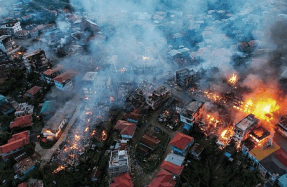UNHEALTHY SECRETS


AFTER PARTITION, 3.5 million Hindu and Sikh refugees came to India from West Pakistan. Several major cities, such as Amritsar, Jaipur, Ajmer, Alwar, Ludhiana, Jammu, Lucknow and Delhi, witnessed an influx of refugees. The Teen Murti residence of Jawaharlal Nehru—the prime minister of the interim Indian government—was also swarmed with refugees. The Kingsway Camp in the outskirts of Delhi, which had been reserved for the royal tents of the indigenous princes during the Delhi Durbar of 1911, now housed the tents of the refugees.
On 24 January 1948, the press information bureau issued a press note. “At no time has the necessity of giving relief to vast numbers of our suffering countrymen been so great and urgent as it is today,” Nehru said in the note. “I feel that it would be desirable to have a central relief fund which can be used for any type of emergency relief of distress but which must now be especially used for the relief and rehabilitation of refugees from Pakistan who have come to India. I’m, therefore, starting a fund called ‘The Prime Minister’s National Relief Fund’ and I invite donations to this fund.”
As the note mentioned, the fund would be managed by a committee. But, in 1985, the committee formed to manage the PMNRF passed on all the rights to use this fund to the prime minister. Since then, the fund is used at the prime minister’s discretion. A joint secretary in the prime minister’s office helps the prime minister manage the fund.
On 28 March 2020, four days after Narendra Modi announced a nationwide lockdown on account of the coronavirus pandemic, another press note was issued by the press information bureau. The title of this note was, “Appeal to donate generously to the Prime Minister’s Citizen Assistance and Relief Fund in Emergency Situations (PM Cares Fund).”
“The pandemic of COVID-19 has engulfed the entire world and has posed serious challenges for the health and economic security of millions of people worldwide,” the note said. “In India too, the spread of coronavirus has been alarming and is posing severe health and economic ramifications for our country.”
In a similar way to the 1948 note, the press release talked about the need for a new fund. “Keeping in mind the need for having a dedicated national fund with the primary objective of dealing with any kind of emergency or distress situation, like posed by the COVID-19 pandemic, and to provide relief to the affected, a public charitable trust under the name of ‘Prime Minister’s Citizen Assistance and Relief in Emergency Situations Fund’ (PM CARES Fund)’ has been set up,” the note said. “Prime Minister is the Chairman of this trust and its Members include Defence Minister, Home Minister and Finance Minister.”
Figures available in the public domain show that substantial money has been donated to the fund, but the government has steadfastly refused to reveal exactly how much money it has received. It has refused to provide information about the fund under right-to-information requests, maintaining a suspicious lack of transparency which is legally dubious. Meanwhile, questions have been raised over tenders processed under the fund. While the fund was supposed to ensure that the health system did not feel a shortage of ventilators and oxygen, it failed miserably in the face of the pandemic’s second wave.
Hospitals ran out of ventilators, and shockingly large numbers of PM CARES ventilators turned out to be faulty. Where the ventilators were available, they went unused because there was a lack of technical staff for operating, installation, repair and maintenance of the machines. Media reports have shown how government neglect ensured oxygen plants promised under PM CARES remained pipedreams during the second wave. The resultant loss of lives necessitates a probe into how this money was spent.
ON 19 MAY 2020, the reported that, till May 2020, at least R10,600 crore had been donated to the PM CARES Fund. This was not an official figure. The newspaper had come up with the number by compiling donation figures available in the public domain. According to this report, private-sector companies donated a total of R5,565 crore. A total of R3,249 crore came to PM CARES from the funds designated for corporate social responsibility by public-sector companies. A sum of R1,191.4 crore was purported to have come from the salary of central-government employees, and R413 crore was donated from the local-area development fund allotted to members of parliament. Three months later, the reported that, of the 55 PSUs with which it had filed RTI applications asking for data on donations, 38 PSUs had responded. Of these, ten PSUs donated R100 crore or more, with Oil and Natural Gas Corporation depositing the maximum amount.
You’re reading a preview, subscribe to read more.
Start your free 30 days





